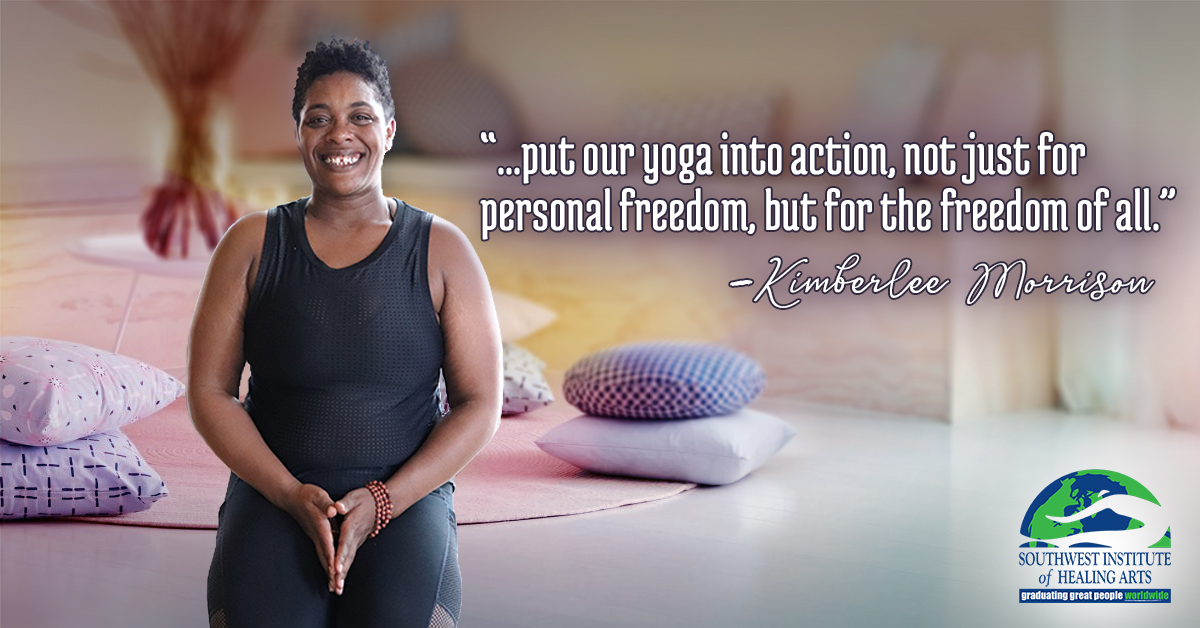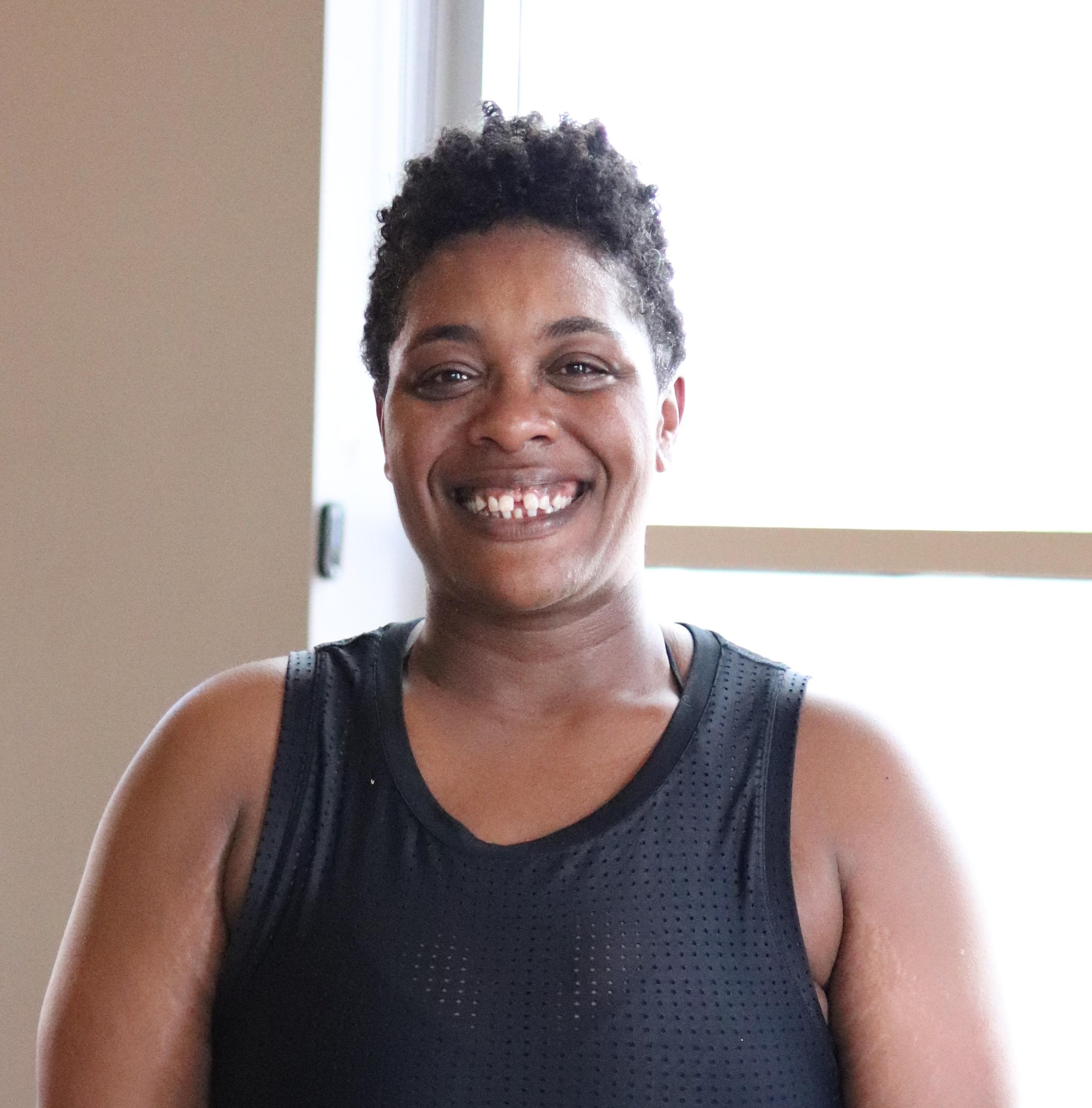Editor’s Note: In keeping with SWIHA’s commitment to uplift BIPOC voices in the spiritual community, today’s guest blog is by Kimberlee Morrison, writer, yogi and founder of Love Revolution Yoga. She uses her voice and her yoga to create inclusion, understanding and empowerment. This blog gives insight in to ways that BIPOC folks in spiritual spaces are made to feel uncomfortable when speaking about injustice within their community and the anxieties unique to their experience. Thank you, Kimberlee!

I started my yoga teacher training in the fall of 2014, against the backdrop of the murders of Tamir Rice, Michael Brown, and Eric Garner — catalysts for the modern Black Liberation Movement (aka: Black Lives Matter). I was only a month into my 200 hour training when Sandra Bland died mysteriously in police custody following a supposed routine traffic stop. I watched the dash cam footage of this traffic stop, as the officer with no probable cause pulled a gun, and dragged Bland out of her car as she begged him to stop. And I carried the trauma and grief over the growing list of others who had been killed by police and white supremacists, with me into class one night.
The room seemed especially heavy that day. We were all new yogis in training, wrestling with all of the things that arise when you begin such a course of self-mastery. Our teacher felt the heaviness and invited us to discuss what was weighing on us. Some people brought up their struggles with anxiety and self-doubt, to which there were detailed responses about how yoga helps us work through these issues.
My heart was racing when I raised my hand and asked how yoga helps us deal with injustice. I talked about Sandra Bland and how terrified I was, when I drove to Tucson over the weekend to attend a funeral. The sight of police cars gave me anxiety; I could be Sandra Bland. So could my sister, my mother, my aunt…
I could feel the collective discomfort in the room when I asked what yoga says about social justice or how to deal with the systemic racism that condones police brutality. There was no detailed response; only the offering that I should “go inward” to discern whether or not my fear was real, and “be the change” I wanted to see in the world.
On the surface, this might seem like the appropriate answer, but in the moment I felt silenced and placated. How is it that the same person who could offer practical wisdom on how yoga helps manage anxiety and animal rights activism, had no wisdom to offer on the topic of human rights? Sure, I am responsible for my own study, and eventually found a way to make social justice part of my yoga practice, but the interaction left me feeling as though my trauma and grief were not welcome in the space.
Bypassing is a Tool of Oppression
What I had experienced was spiritual bypassing: The practice of using spiritual ideas to avoid uncomfortable issues. According to yoga teacher and author of Skill in Action, Michelle Johnson, spiritual bypassing is used to avoid deepening any conversations about the impact of our actions and our responsibility to create a just world. It allows yoga spaces to suggest it’s enough to live by the tenants of yoga, without considering how we might apply those tenets in our off-the-mat lives.
In the case of my experience, I’m sure the instructor meant well, and maybe she didn’t know how yoga could become a catalyst for creating a more just world. However, her use of common platitudes to quickly bypass the topic, reinforced the idea that racism, social justice, and police brutality were my responsibility — and the responsibility of other BIPOC folks. But oppression is never just the problem of the oppressed; that’s a problem for those who benefit from the oppression to correct.
If you’ve never experienced spiritual bypassing, you’re probably thinking my experience is unique, and I am responsible for how I processed the interaction. This is just another way to avoid collective responsibility for the violence inflicted on marginalized groups within the yoga and mindfulness communities. By avoiding accountability, these communities perpetuate further violence on the people in marginalized groups. We also miss out on an important opportunity to put our yoga into action, not just for personal freedom, but for the freedom of all.
Lokah Samastah Is a Call to Action
“Lokah samastah sukhino bhavantu”: May all beings everywhere be happy and free; may my words, thoughts, and actions contribute to the happiness and freedom of all.
Some of these ideas might be uncomfortable for you. I encourage you to be with that discomfort and ask yourself how you can let it shift your perspective. You may not have any personal experiences with bypassing, but you can examine your own behavior when uncomfortable topics come up (hint: it’s probably not only around the issue of race). Do you become defensive or use some spiritual platitude (“things happen for a reason”/ “focus on the positive”) to shut down the conversation? What can you do differently going forward?
Here’s a homework assignment to help facilitate this mindset shift: For the next 30 days, meditate on the Lokah Samastah mantra by chanting the mantra for at least 10 minutes each day. The sound and sanskrit have the effect of helping you internalize the mantra by sending the vibration into your entire being. As you consider the truth of the mantra, start to inquire within how you can show up in the spirit of Lokah Samastah by taking action to create a world where all beings can truly be happy and free.


